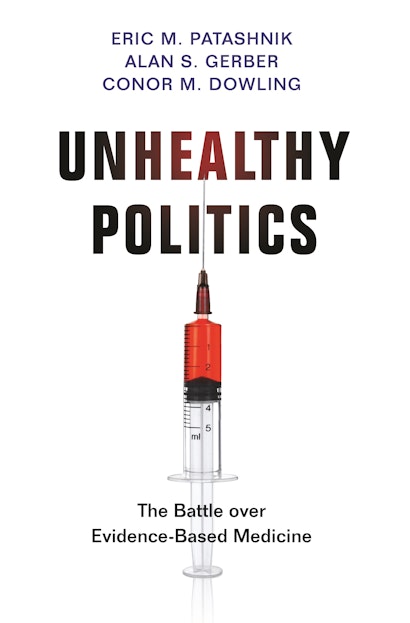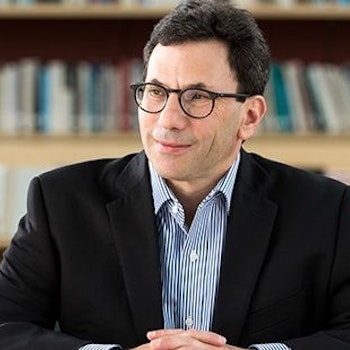The U.S. medical system is touted as the most advanced in the world, yet many common treatments are not based on sound science. Treatments can go into widespread use before they are rigorously evaluated, and every year patients are harmed because they receive too many procedures—and too few treatments that really work. Unhealthy Politics sheds new light on why the government’s response to this troubling situation has been so inadequate, and why efforts to improve the evidence base of U.S. medicine continue to cause so much political controversy and public trepidation.
This critically important book draws on public opinion surveys, physician surveys, case studies, and political science models to explain how political incentives, polarization, and the misuse of professional authority have undermined efforts to tackle the medical evidence problem and curb wasteful spending. It paints a portrait of a medical industry with vast influence over which procedures and treatments get adopted, and a public burdened by the rising costs of health care yet fearful of going against “doctor’s orders.” The book shows how the government’s efforts to promote evidence-based medicine have become mired in partisan debates. It also proposes sensible solutions that can lead to better, more efficient health care for all of us.
Unhealthy Politics offers vital insights not only into health policy but also into the limits of science, expertise, and professionalism as political foundations for pragmatic problem solving in American democracy.
Awards and Recognition
- Winner of the 2018 Don K. Price Award, Science, Technology & Environmental Politics Section of the American Political Science Association
- Winner of the 2018 Louis Brownlow Book Award, National Academy of Public Administration
"Persuasive."—Carey Goldberg, WBUR's CommonHealth blog
"The United States stands out among rich countries in resisting evidence-based medicine—not in theory, perhaps, but in practice. In this informative book, the authors, all political scientists, document this phenomenon and then consider why ordinary people, physicians, and politicians all resist public spending on research that would produce obvious benefits for everyone."—Richard N. Cooper, Foreign Affairs
"Unhealthy Politics connects the dots in the complex relationships among physicians, medical societies, the public, and politicians. . . . Unhealthy Politics, in the end, is most convincing in describing the limited extent to which evidence can guide the activities of key actors. The irony is this: For those who wish to see evidence-based medicine implemented, more and better medical evidence might not be the answer. Rather, we need better evidence about how to implement what we already know."—Romana Hasnain-Wynia, Health Affairs
"A remarkable example of the contribution that political science has to make to discussions of policy problems that have chiefly concerned other fields . . . . Patashnik, Gerber, and Dowling bring to bear not only a wealth of original survey evidence . . . but also a wealth of theoretical insights from the policy process and legislative politics literatures."—Journal of Politics
"If you want to know why we're so lousy at avoiding wasteful, expensive care in the United States, read Unhealthy Politics. It’s an invaluable resource for understanding why commonsense solutions get mired in political controversy—and how we might get out of the partisan rut we’re in."—Nicholas Bagley, University of Michigan Law School
"Why is American health care so wasteful? In a masterstroke of political economy, Patashnik, Gerber, and Dowling show that it is not just that every treatment has its own constituency, but also that the political coalition for evidence-based treatment is weak, publicly doubted, corroded by partisanship, and includes few doctors. Following their advice might save us hundreds of billions."—Daniel Carpenter, Harvard University, author of Reputation and Power: Organizational Image and Pharmaceutical Regulation at the FDA
"A searing indictment of American medicine and health-care policy. Unhealthy Politics is a provocative, compelling exploration of the dismal state of evidence-based medicine in the United States. Original, persuasive, and essential reading."—Jonathan Oberlander, author of The Political Life of Medicare
"Much of the $3 trillion America spends on health care is expended on care of little demonstrated value. At the same time, much care proven to genuinely work is not reliably delivered to the patients who need it most. In principle, comparative effectiveness research (CER) provides tools to do better. Yet in matters large and small, physicians, politicians, and the American public itself combine to oppose the use of rigorous clinical evidence to guide medical care. Eric Patashnik, Alan Gerber, and Conor Dowling straddle the boundaries of political science and policy analysis to explore why this is so. This is a magnificent book. It will be read for years to come."—Harold Pollack, University of Chicago
"With U.S. health care in critical condition, we as Americans must ask: How did we get here? In Unhealthy Politics, Patashnik, Gerber, and Dowling provide a convincing explanation as they illuminate and guide the reader through the labyrinth of current health policy."—Jonathan S. Skinner, Dartmouth College
"If you want to know why we're so lousy at avoiding wasteful, expensive care in the United States, read Unhealthy Politics. It’s an invaluable resource for understanding why commonsense solutions get mired in political controversy—and how we might get out of the partisan rut we’re in."—Nicholas Bagley, University of Michigan Law School
"Unhealthy Politics sheds light on the political forces that have limited the development of a better evidence base for health care in the United States. The book is beautifully written, succinct, and addresses an important topic. It will be widely read."—Michael K. Gusmano, coauthor of Health Care in World Cities
"Unhealthy Politics brings together numerous insights from political science along with new empirical evidence to shed light on one of the most important debates in health-care policy in the United States—the issue of how to produce better evidence to guide decisions about medical care. The book is timely, given rising health-care costs and increasing polarization about the role the state might play in addressing them. An informative and stimulating read."—Ann Campbell Keller, author of Science in Environmental Policy




